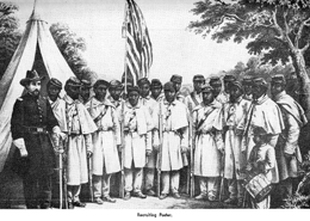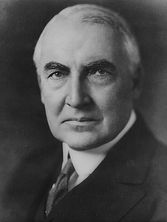
What is JUNETEENTH?
Juneteenth, or June 19th, 1865, is considered the date when the last captives in America were freed. Although the rumors of freedom were widespread before this, actual emancipation did not come until General Gordon Granger rode into Galveston, Texas and issued General Order No. 3, on June 19th, 1865 almost two and a half years after President Abraham Lincoln signed the Emancipation Proclamation.
OUR CALL TO FREEDOM
“Little Known Black History Fact From Ohio” - President Lincoln issued the Emancipation Proclamation on September 22nd, 1862, notifying the states in rebellion against the Union that if they did not cease their rebellion and return to the Union by January 1st, 1863, he would declare their Captives forever free. Needless to say, the proclamation was ignored by those states that seceeded from the Union. Furthermore, the proclamation did not apply to those Captive -holding states that did not rebel against the Union. As a result, about 800,000 Captives were unaffected by the provisions of the proclamation. It would take a civil war to enforce the Emancipation Proclamation and the 13th Amendment to the U.S. Constitution to formally outlaw Captivity in the United States.
Juneteenth, or June 19th, 1865, is considered the date when the last captives in America were freed. Although the rumors of freedom were widespread before this, actual emancipation did not come until General Gordon Granger rode into Galveston, Texas and issued General Order No. 3, on June 19th, 1865 almost two and a half years after President Abraham Lincoln signed the Emancipation Proclamation.
OUR CALL TO FREEDOM
“Little Known Black History Fact From Ohio” - President Lincoln issued the Emancipation Proclamation on September 22nd, 1862, notifying the states in rebellion against the Union that if they did not cease their rebellion and return to the Union by January 1st, 1863, he would declare their Captives forever free. Needless to say, the proclamation was ignored by those states that seceeded from the Union. Furthermore, the proclamation did not apply to those Captive -holding states that did not rebel against the Union. As a result, about 800,000 Captives were unaffected by the provisions of the proclamation. It would take a civil war to enforce the Emancipation Proclamation and the 13th Amendment to the U.S. Constitution to formally outlaw Captivity in the United States.

OHIO FREEDOM FESTIVAL
When is Juneteenth Celebrated?
Annually, between June 13 - 19th, in more than 250 cities in the United States. Some cities sponsor week-long celebrations, culminating on June 19th, while others hold shorter celebrations.
Why is Juneteenth Celebrated?
It symbolizes the end of captivity. Juneteenth has come to symbolize for many African-Americans what the fourth of July symbolizes for Americans -- Freedom for all. It serves as a historical milestone reminding Americans of the triumph our human spirit won over the cruelty of Captivity . It honors those African-American ancestors who survived the inhumane institution of bondage, compelling pride and inspiration, in the marvelous legacy of resistance and the perseverance they left us.
Why Were Captives in Texas the Last to Know that They Were Free?
During the Civil War, Texas did not experience any significant invasion by Union forces. Although the Union army made several attempts to invade Texas, they were thwarted by Confederate troops. As a result, Captivity in Texas continued to thrive. In fact, because Captivity in Texas experienced such a minor interruption in its operation, many Captive owners from other Captive-holding states brought their Captives to Texas to wait out the war. News of the emancipation was suppressed due to the overwhelming influence of the captives owners.
When is Juneteenth Celebrated?
Annually, between June 13 - 19th, in more than 250 cities in the United States. Some cities sponsor week-long celebrations, culminating on June 19th, while others hold shorter celebrations.
Why is Juneteenth Celebrated?
It symbolizes the end of captivity. Juneteenth has come to symbolize for many African-Americans what the fourth of July symbolizes for Americans -- Freedom for all. It serves as a historical milestone reminding Americans of the triumph our human spirit won over the cruelty of Captivity . It honors those African-American ancestors who survived the inhumane institution of bondage, compelling pride and inspiration, in the marvelous legacy of resistance and the perseverance they left us.
Why Were Captives in Texas the Last to Know that They Were Free?
During the Civil War, Texas did not experience any significant invasion by Union forces. Although the Union army made several attempts to invade Texas, they were thwarted by Confederate troops. As a result, Captivity in Texas continued to thrive. In fact, because Captivity in Texas experienced such a minor interruption in its operation, many Captive owners from other Captive-holding states brought their Captives to Texas to wait out the war. News of the emancipation was suppressed due to the overwhelming influence of the captives owners.

Warren G. Harding (1865-1923)
1st Negro President From Ohio
The book Warren G. Harding, President of the United States, is one of the rarest books ever printed in America. There are only three known copies. Of all the American presidents who died in office, none had more questions surrounding his sudden death than the 29th President, Warren Harding. The file is still missing and is one of history's most famous cases. It didn’t take Professor William Estabrook Chancellor of Wooster College (1920) to make a study of the Harding family to supply the genealogical material for “Murmuring Colored Campaign” Pamphlet. The Norman-Harding family could have supplied the information.
PERHAPS THE MOST SURPRISING single event of Harding Presidency was his blunt speech on October 26, 1921, to a segregated crowd in Birmingham, Alabama, stating that democracy would always be a sham until African Americans received full equality in education, employment, and political life. Harding went further than any of his predecessors since Lincoln to call an end to prejudice." The first President to discuss civil rights in the South so frankly, he was loudly cheered by blacks and met with silent stares from whites as he declared: “I want to see the time come when black men will regard themselves as full participants in the benefits and duties of American citizenship. . . . We cannot go on, as we have gone on for more than half a century, with one great section of our population . . . set off from the real contribution to solving national issues, because of a division of race lines. . . . Let the black man vote when he is fit to vote, prohibit the white man [from] voting when he is unfit to vote.” HE CERTAINLY WANTED HIS FAMILY TO HAVE THE CIVIL RIGHTS HE HAD ENJOYED SINCE CROSSING THE "COLOR LINE."
1st Negro President From Ohio
The book Warren G. Harding, President of the United States, is one of the rarest books ever printed in America. There are only three known copies. Of all the American presidents who died in office, none had more questions surrounding his sudden death than the 29th President, Warren Harding. The file is still missing and is one of history's most famous cases. It didn’t take Professor William Estabrook Chancellor of Wooster College (1920) to make a study of the Harding family to supply the genealogical material for “Murmuring Colored Campaign” Pamphlet. The Norman-Harding family could have supplied the information.
PERHAPS THE MOST SURPRISING single event of Harding Presidency was his blunt speech on October 26, 1921, to a segregated crowd in Birmingham, Alabama, stating that democracy would always be a sham until African Americans received full equality in education, employment, and political life. Harding went further than any of his predecessors since Lincoln to call an end to prejudice." The first President to discuss civil rights in the South so frankly, he was loudly cheered by blacks and met with silent stares from whites as he declared: “I want to see the time come when black men will regard themselves as full participants in the benefits and duties of American citizenship. . . . We cannot go on, as we have gone on for more than half a century, with one great section of our population . . . set off from the real contribution to solving national issues, because of a division of race lines. . . . Let the black man vote when he is fit to vote, prohibit the white man [from] voting when he is unfit to vote.” HE CERTAINLY WANTED HIS FAMILY TO HAVE THE CIVIL RIGHTS HE HAD ENJOYED SINCE CROSSING THE "COLOR LINE."